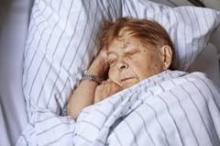Nocturnal cortisol levels explained up to 16% of changes in learning, memory, and working memory in patients with obstructive sleep apnea, a study showed.
But severity of obstructive sleep apnea (OSA) did not itself predict neurocognitive impairment, said Dr. Kate M. Edwards of the University of Sydney in Lidscombe, Australia, and her associates, who conducted the study at the University of California, San Diego.
"These findings suggest that OSA-related alterations in [hypothalamic-pituitary-adrenal] activity may play a key role in the pathophysiology of neuropsychologic impairments in OSA," the investigators wrote (Sleep Med. 2014;15:27-32).
The researchers enrolled 55 men and women with OSA and measured blood cortisol levels every 2 hours for 24 hours. Participants underwent polysomnography the next night and took a battery of tests to assess seven cognitive domains. The oxygen desaturation index (ODI) was used as an index of OSA severity.
In univariate analyses, the mean apnea-hypopnea index, ODI, and nighttime cortisol levels were significantly associated with global deficit scores and particularly with domains of learning, memory, and working memory, said the investigators. In hierarchical linear regression analyses, nighttime cortisol levels accounted for 9%-16% of variance in the three domains, while ODI (apnea) severity did not predict additional variance, they reported.
"Our data are in line with the literature reporting that chronic exposure to elevated physiologic cortisol levels is associated with a decline in neurocognitive function and hippocampal structure," the investigators said. "The functional effects of cortisol on reduced memory function have been demonstrated by experimental cortisol treatment and stress-induced cortisol level increases."
"The treatment of OSA with CPAP [continuous positive airway pressure] has been reported to show improvements in some aspects of neuropsychologic function, though findings are inconsistent," the investigators wrote.
"It may yield interesting data if future studies address the possibility that CPAP treatment effects on neurocognitive function are mediated by alterations in [hypothalamic-pituitary-adrenal] function, specifically reductions in nighttime cortisol levels."
The work was funded by University of California, San Diego, grants. The authors disclosed no relevant financial conflicts of interest.


